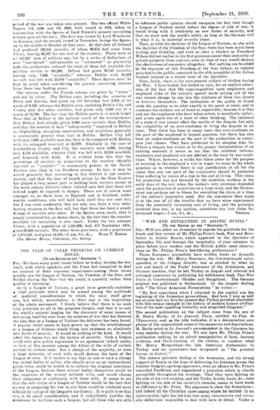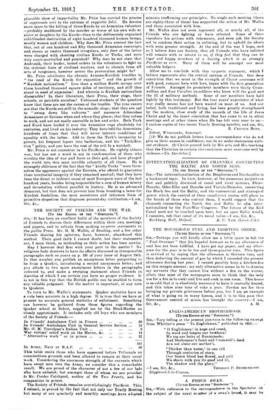" WAR AND REVOLUTION IN ASIATIC RUSSIA." [To THE EDITOR
or THE "SPECTATOR.") Sta,—Will you allow an Armenian to express his gratitude for the frank and fair review of Mr. Philips Price's book, War and Revo- lution in Asiatic Russia, which appeared in the Spectator of September 7th, and through the hospitality of your columns to place before your readers and the British public some observa- tions on Mr. Philips Price's bewildering performance ?
Three European journalists have written books on Armenia during the war. Mr. Harry Stuermer, the Constantinople corre- spondent of the Cologne Gazette, was so shocked by what he saw and heard of the Turks' treatment of the Armenians, and German inaction, that he left Turkey in disgust and relieved hie; outraged conscience by publishing his well-known book, Two War Years in Constantinople (Hodder and Stoughton). The German original was published in Switzerland. In the chapter dealing with " The Great Armenian Persecutions" he writes :—
" My first experience when I returned to the capital was the beginning of the Armenian persecutions. And here I may as well say at once that my love for present-day Turkey perished absolutely with this unique example in the history of modern human civiliza- tion of the meet appalling bestiality and misguided Jingoism."
The second publication on the subject came from the pen of M. Henry Barby, of Le Journal, Paris, entitled Au Pays de l'Epouvante, and, as the title indicates, it is a denunciation sans phrase of the unparalleled crime of the massacres and deportations. M. Barby acted as Le Journal's correspondent in the Caucasus for some months during the war. We now have Mr. Philips Price's publication seeking, by an adroit manipulation of facts, hearsay evidence, and black-washing of the victims, to condone what Mr. Henry Morgenthau—the late American Ambassador to Turkey and an eyewitness—has designated as "the greatest horror in history."
The intense patriotic feeling of the Armenian, and his strong support of Russia in the hope of delivering his kinsman across the frontier from his age-long oppressors, were an offence to Mr. Price's one-sided Pacificism and engendered a prejudice which is clearly perceptible throughout his writings. That they were fighting on the side of his.own country, and the Turks, Kurds, Lazia, &c., were fighting on the side of his country's enemies, seems to have, made no difference to Mr. Price. His eagerness to show the Armenians— and indeed all the Christian races among whom ho tarried—in an tinfavoprable light has led him into many inaccuracies and unten- able deductions impossible to deal with here in detail. Under a plausible show of impartiality Mr. Price has carried the process of suppressio veri to the extreme of suggestio falsi. He devotes more space to the killing of three Kurds by an Armenian volunteer —probably maddened by the murder or worse of his own wife or sister or daughter by the Kurds—than to the deliberately organized cold-blooded destruction of eight hundred thousand human beings, mostly women and children.. Why does Mr. Price conceal the fact that, out of one hundred and fifty thousand Armenian conscripts and eleven or twelve thousand irregulars, only four of the latter were charged with shooting civilian Kurds or Turks, and were duly court-martialled and punished? Why does he not state that Andranik, their leader, issued orders to the volunteers to fight on the strictest lines of civilized warfare, and to abstain from all acts of vengeance, however severe the provocation might be?
Mr. Price attributes the chronic Armeno-Kurdish troubles to " the need of the Kurds for expaneion " and the growth of
Kurdish nationalism." Less than a million Kurds occupy over three hundred thousand square miles of territory, and still they stand in need of expansion! And wherein is Kurdish nationalism discernible? In their literature, their Press, their stage, their schools, or patriotic societies? Unbiassed students of the question know that these are not the causes of the trouble. The true causes are that the Kurds are still in the nomadic stage; that they are apt to "swoop down like vultures" and massacre defenceless Armenians or Syrians when and where they please; that they refuse to work, and are not easily amenable to law and order. Both Turk and Kurd have lorded it over the Armenian raya absolutely for centuries, and lived on his industry. They have told the Armenians hundreds of times that they will never tolerate conditions of equality with the latter. Add to these the Turk's incapacity to govern, his frequent lapses into barbarism, and his " Turkifica- tion " policy, and you have the root of the evil in a nutshell.
Mr. Price is not consistent in his Pacificism. He rightly abhors war, but has not a word to say in condemnation of those who worship the idea of war and force as their god, and have plunged the world into this most terrible calamity of all times. He is strangely oblivious of the fact that the" kindly Turks "were them- selves the aggressors against the Entente, who offered to guarantee their territorial integrity if they remained neutral; that they have been the direct or indirect cause of most European wars of the last hundred years, besides being responsible for a sum of human misery and devastation without parallel in history. He is an advanced democrat, but that does not prevent him from breaking a lance for Kurdish feudalism, the most monstrous and inhuman form of primitive despotism that disgraces present-day civilization.—I am,



































 Previous page
Previous page